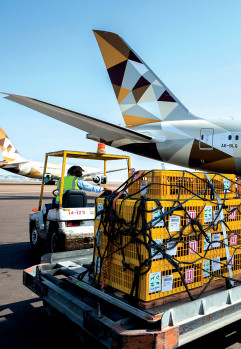CAN TECHNOLOGY MOVE THE MOVERS?
Each month, Flashes invites a speaker from the Dubai Knowledge Summit to contribute to the issue. Here, Sarfaraz Alam, CEO and Co-Founder of HashMove, discusses why the logistics industry must embrace new technologies.
Whether it is demonstration effect or tipping point, when the most visible industries around us transform rapidly even the most diehard incumbents are forced to take stock.
The logistics industry seems to be entering a phase wherein consumers, stakeholders and analysts are all beginning to have the same feeling. They see a new wind blowing, driven by transformation in the aviation, hospitality and retail sectors, which are demanding their logistics backbone to catch up.
They are also beginning to acknowledge where problems lie, and how they can and should be addressed. There is clearly more than one elephant in the room.
Transparency and collaboration lead the herd but are part of the larger question of how technology is challenging the way processes are followed in an industry steeped in leveraging relationships as the market maker. Whichever way one looks at it, the state of affairs is simply not good enough for an industry looking at a potential targeted market of $15 trillion by 2024, $72 billion in GCC alone.
When it is quickly becoming established that ‘every company is a technology company’ and ‘IT strategy is the business strategy’, logistics providers can no longer be an exception.
The good news is technology has the answers to the challenges. Since any good prescription needs extensive investigation and clear-cut diagnosis, let us start with where we stand today.
Anyone in brick and mortar business today is facing the pressure of digitally-enabled change. That applies as much to an electronics manufacturer in China, a retailer in Venezuela or fruit supplier in New Zealand. Going by this logic, I infer that every company is a logistics company. Here’s what I mean by this. What you sell today is becoming less of a differentiator than how you sell it, or should I say how you get it to the end consumer – ask Jeff Bezos.
As businesses embrace the strategic importance of their supply chain efficiency, logistics providers need to be ready with solutions that meet the digital landscape in which their customers operate. Above all, they have to watch out for, and possibly embrace, disruption that manifests itself every now and then. Those investing in utilizing technology – to enhance level of services – will succeed in retaining the established relationships they rely on.
WHAT AILS THE INDUSTRY?
The Holy Grail of logistics has always been the concept of a seamless, joined up end-to-end supply chain where all participants collaborate to share data effectively to improve If the logistics providers do not take the reins on this, the market will correct itself. Let me share an example. Abu Dhabi-based Etihad Cargo recently added to its growing list of specialized products with the launch of Fresh Forward. This launch was in lineefficiency. This ensures that cumulative results benefit all parties in the chain from consumer to provider.
If the logistics providers do not take the reins on this, the market will correct itself. Let me share an example. Abu Dhabi-based Etihad Cargo recently added to its growing list of specialized products with the launch of Fresh Forward. This launch was in line with its support for a cold chain industry, responsible for importing perishable goods to the UAE.
It will ensure that fresh fruits and vegetables, dairy, fish, meat and flowers move seamlessly across Etihad Cargo’s global network to their final destination. The launch marked an expansion of Etihad’s value chain, offering to include last-mile delivery over and above its conventional airport-to-airport model.
“When Ubers and Airbnbs of this world
bring services to the palm of our hands,
logistics can no longer work on ledgers
tucked away in dusty drawers”
SARFARAZ ALAM, CEO AND CO-FOUNDER, HASHMOVE
The new venture makes perfect sense from the airline perspective but is another example of the failure of the logistics industry to reach where eagles dare. While Etihad has the capacity and wherewithal to expand in this space, and rightly so, a more organised and customised logistics solution could have surely managed at least some share of this pie.
The logistics industry is beset with challenges related to the lack of a digitalized information hub, inefficient coordination, unreliable collaborations, intermittent visibility and the absence of holistic logistics. A growing void of value-added services completes this perpetual cycle of inefficiency.
UBERIZATION OF LOGISTICS
The factor to be feared – and embraced – the most is indeed consumer expectation. No logistics player can expect to apply old world service standards to the shipment of today. Definitely not anymore.
The need to take a holistic and integrated perspective of your supply chain has always been important, but it’s even more critical today as customer expectations around cost, quality and service become more demanding.
Part of the challenge to achieving this view is the fragmented technology landscape that many companies face today. When Ubers and Airbnbs of this world bring services to the palm of our hands, logistics can no longer work on ledgers tucked away in dusty drawers.
HashMove is aiming to transform logistics by simplifying global, multimodal, end-to-end logistics through its smart, innovative digital platform where shippers and service providers can connect and transact seamlessly. This digital platform powers a smart logistics marketplace and provides digital portals for logistic providers and provider networks, offering enterprise closed loop and cold chain logistics solutions.
The ‘demonstration effect’ that I mentioned at the outset is indeed catching up. That suggests the time is ripe for ‘Uberization’ of logistics shipments and a brainwave will soon make things look ridiculously simple. Whether that happens sooner or later remains to be seen.”








